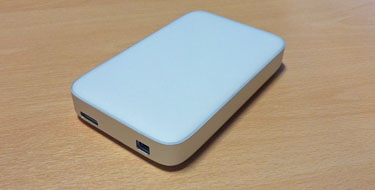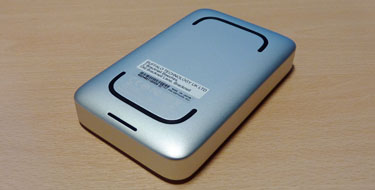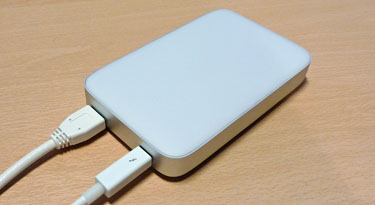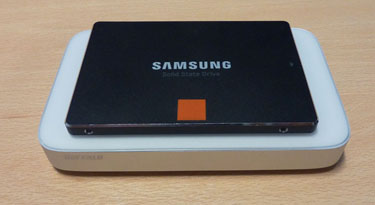Thunderbolt-interfacing SSD
Portable Thunderbolt
2013 is shaping up to be the year that Thunderbolt, a nascent hardware interface, is outfitted to mainstream external-storage and display devices. Providing PCI-Express speeds and a DisplayPort interface, with up to 10W of DC power down one cable, Thunderbolt is designed to offer a one-cable connection for a myriad of peripherals.
We've seen Thunderbolt-equipped motherboards from MSI and Gigabyte, along with expensive external-storage solutions from Western Digital, and now Buffalo is looking to get in on juicy transfers by incorporating a solid-state drive (SSD) inside a Thunderbolt-equipped enclosure. Sounds like a recipe for speedy storage, so let's delve a little deeper into the MiniStation Thunderbolt Portable SSD (MTPS).
But a little background first. Buffalo currently retails nine MiniStation drives and, as the name suggests, each is focussed on providing external storage in small form factors. Most MiniStation solutions incorporate a standard 2.5in SATA hard drive - up to 2TB in capacity - inside an enclosure with support for USB 3.0. This setup strikes a nice balance between capacity, speed, and cost.
Upping the ante in terms of performance, two MiniStations are outfitted with both Thunderbolt and USB 3.0 connectivity. The cheaper of the two, Thunderbolt Portable HDD, houses either a 500GB or 1TB spinner and interfaces with the two external connections via an internal SATA bridge. Step it up to the MTPS and either a 128GB or 256GB SSD is hooked up internally via a SATA 6Gbps bridge chip, providing ultimate performance in a pocketable form factor. We have the 128GB version in review today.
Thunderbolt and SSD: a perfect match
Presented as an attractive and well-built aluminium enclosure, the two fast interfaces are clearly visible on the front. It makes implicit sense for Buffalo to offer USB 3.0 (and USB 2.0) as a secondary connection, especially with the relative dearth of Thunderbolt-equipped motherboards and laptops up until recently. The combination of a power-efficient SSD and wattage-carrying capability of both connections - 4.5W and 10W for USB 3.0 and TB, respectively - means the drive is solely bus powered.
Design cues suggest that Buffalo has Apple's latest laptops and desktops in mind, many of which support Thunderbolt, but the MTPS, in our case, arrives unformatted and can be setup for Apple's HFS+ and Windows' usual NTFS from within the operating systems.
The underbelly exposes two semi-circular rubber sections that provide solid grip. The 'slit' on the nearside of the right-hand photo lights up white when the drive is connected to a computer, though being on the underside and a little set back means that you rely on reflections to verify if it's connected - the MTPS makes no noise, obviously. We suppose the lighting, arranged this way, is discrete if nothing else.
Buffalo includes cables for both interfaces, though at 45cm in length we'd like them to be a little longer. And while the drive is comfortably pocketable, at 23mm thick and weighing 260g, which is more than a 2TB WD My Passport, it feels both chunkier and heavier than perhaps it should be. Aside from the drive and cabling, there's no bundled software in the package that's backed up by a three-year warranty.
Crucial's m4 provides the guts
So what's inside the enclosure, we hear you ask? Buffalo teams up with memory giants Micron and shoehorns a C400 SSD into the MiniStation Thunderbolt. Also known as the Crucial m4 and offering solid performance, the drive's Achilles heel is, by today's standards, relatively meagre sequential writing speeds of 175MB/s. This in turn brings us onto what is probably the MTPS's own Achilles heel: pricing. The 128GB m4 SSD costs around £80, but Buffalo's enclosure is nigh-on £200. Now, even optimistic pricing for a Thunderbolt caddy and cable doesn't merit a £120 premium, no matter how well-presented they are. Before passing final judgement, let's run the numbers and see how it stacks up.













